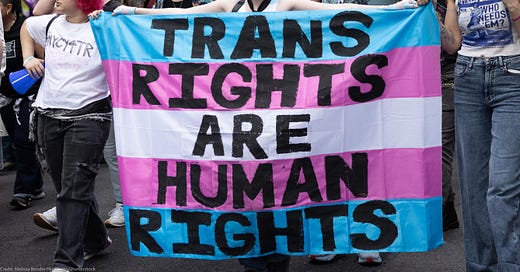The recent tumultuous weekend laid bare the precarious state of American democracy, underscoring the critical importance of every election, every vote. While the "No Kings" protests saw millions worldwide unite in a powerful display of collective hope and democratic spirit, reaffirming that the people, not authoritarian figures, ultimately hold power, these inspiring movements were tragically juxtaposed with deeply disturbing events that reveal the accelerating erosion of fundamental rights.
The Supreme Court's decision to uphold a ban on gender-affirming care, coupled with the Trump administration's zeroing out of funding for a suicide prevention hotline specifically for the LGBTQ+ community, paints a grim picture. This coordinated attack on the most marginalized, particularly the transgender community, is not an isolated incident. It is a calculated strategy that, as history painfully demonstrates, inevitably expands to engulf other groups. The 1% of the population identifying as transgender, non-binary, or genderfluid are disproportionately vulnerable to abuse, self-harm, sexual assault, homelessness, and poverty. Medical consensus is clear: early intervention and gender-affirming care significantly reduce the risk of suicide among these individuals. Yet, "parents' choice" and "freedom" are weaponized to deny crucial healthcare, even as the same rhetoric champions parental rights when it comes to banning books or refusing vaccinations.
The complicity of influential media outlets, like The New York Times, in legitimizing transphobia through "faux-neutral debate" is a dangerous phenomenon. When a community's very existence and right to healthcare are presented as open for "debate," it normalizes bigotry and provides intellectual cover for harmful policies. As many advocates rightly point out, if your life has never been up for debate, you are undeniably part of a privileged class.
The consequences of apathy, bigotry, and misinformation are profound and far-reaching. The millions of Americans who sat out the last election, or allowed fear to drive their votes, have inadvertently enabled an administration that continues to dismantle essential services, from cancer research and SNAP benefits to USAID, leading to an estimated 300,000 vulnerable children's deaths. This pattern of disregard for human life and dignity is further evident in foreign policy, particularly concerning the Middle East.
The historical thread of dehumanization runs deep, connecting past injustices to present-day crises. The same mindset that justified the subjugation of indigenous populations, the horrors of the transatlantic slave trade, and the brutalities of Jim Crow, now fuels discriminatory policies against marginalized communities. The forced sterilization of Black men and women, justified by pseudo-scientific eugenics and the perception of their "criminal" nature, echoes in today's attacks on gender-affirming care. The insidious narrative remains consistent: "They are terrible, they are taking your kids, they need to be controlled." This fear-mongering, amplified by media, aims to reinforce systems not built for universal flourishing.
The demonization of Muslims in Western discourse is a potent example of this enduring pattern. From the Crusades and medieval literature like The Song of Roland to Dante's Inferno and Voltaire's Enlightenment-era plays, Muslims have been consistently cast as "heathens" or "fanatics." This historical prejudice seeped into 20th-century pop culture, depicting Arabs as licentious bandits in films like The Sheikh, or demonizing Black Muslim figures like Malcolm X and Muhammad Ali, who were hated for their faith and political stances.
This historical context reveals a chilling continuity: who is deemed acceptable to dehumanize and who is not. The perceived "otherness" of various groups – whether Black, Indigenous, Muslim, or transgender – has consistently served as justification for their oppression and the denial of their fundamental rights.
The current political landscape demands a radical shift in perspective. The belief that "both sides" are equally problematic in foreign policy, or that one party is "lesser of two evils," blinds us to the systematic dismantling of rights at home and abroad. When a president greenlights what many consider genocide in Gaza while simultaneously attacking the most vulnerable communities domestically, it exposes a foundational issue. The Iran Nuclear Deal, a diplomatic triumph, was unilaterally dismantled, driven by a deeply ingrained disregard for Muslim nations. This deeply ingrained racism, which permeates even seemingly distinct policy areas, erases the humanity of "othered" groups, including Palestinian Christians whose faith is overlooked due to their ethnicity.
Ultimately, understanding the interconnectedness of these oppressions is paramount. The same tools of fear, lies, and reinforced narratives that targeted Muslims post-9/11 are now deployed against the transgender community, immigrants, and women. As the travel ban expanded beyond Muslim-majority nations to include Latin American and African countries, the pattern becomes undeniable: no one is truly safe from fascism's reach. As Pastor Niemöller's famous poem warns, indifference to the persecution of one group inevitably leads to the persecution of all.
For a multi-racial democracy to truly thrive, the freedom of one must guarantee the freedom of all. This requires shedding the ego-driven mindset that prioritizes individual comfort over collective progress. The stakes are too high for apathy or fear. The current moment is a stark reminder that the systems in place were not built for everyone's prosperity, and it is up to us to collectively overturn them before it is too late.















Share this post